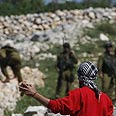
Palestinian rioter
צילום: AFP
Did IDF soldiers lie?
Inconsistent testimonies prompt Military Police to probe clash that left two rioters dead
Military Judge Advocate General Brigadier-General Avi Mandelblit on Tuesday ordered the Military Police to investigate the circumstances surrounding the death of two Palestinian teens during clashes that broke out on Saturday south of Nablus.
The two teens, 19-year-old Osaid Qadus and 16-year-old Muhammed Qadus, were killed during clashes that erupted in a village near Nablus.
The IDF said that Palestinian rioters were stoning the troops, who had to respond using crowd control measures. Mohammed was killed instantly and Osaid, who suffered grave head injuries, died the following day.
Brig.-Gen. Mandelblit ordered the investigation following discrepancies found in the accounts of the event, which was initially investigated by the Judea and Samaria Division.
The JAG inquiry is meant to determine whether any of the troops lied during the initial investigation.
The initial probe found that rioters were stoning IDF and Border Guard forces. The troops attempted to arrest several suspects, but as the stoning persisted, the soldiers fired rubber-coated bullets at the crowd.
The Palestinians provided the IDF with X-rays of the bodies performed by a Nablus hospital, which allegedly prove the two teens were hit with live rounds – not rubber-coated bullets.
The X-rays prompted Brig.-Gen. Nitzan Alon, head of the Judea and Samaria Division, to order a forensics investigation. The IDF said the medical and forensics experts chosen will determine the exact cause of death based on the evidence found.
Meanwhile, military investigators are looking into the attempted pitchfork attack that took place near the West Bank village of Awarta and left two Palestinians dead.
The IDF has so far been unable to determine whether the Palestinians in fact intended to use the pitchfork as a weapon, as it was left on the ground at the time of the supposed attack.
"Under the circumstances, the squad commander involved may have done the right thing in response to a threatening situation," a military source insisted, but qualified that "in hindsight, given all the facts we know now, this event might have ended differently."










